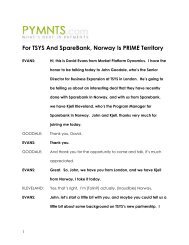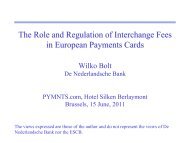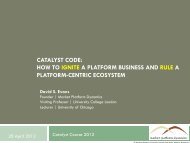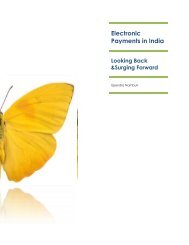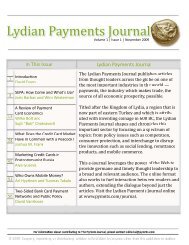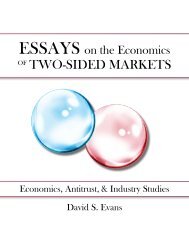Interchange Fees: The Economics and Regulations of What
Interchange Fees: The Economics and Regulations of What
Interchange Fees: The Economics and Regulations of What
- No tags were found...
You also want an ePaper? Increase the reach of your titles
YUMPU automatically turns print PDFs into web optimized ePapers that Google loves.
36 INTERCHANGE FEES• did not ensure that the proposal would be in the interest <strong>of</strong> consumers; <strong>and</strong>,• should withdraw the proposal <strong>and</strong> revise it so that it would at least not harm consumers. 3• This introduction summarizes our basis for these findings.A. Has <strong>The</strong>re Been a Proper Diagnosis <strong>of</strong> the Problem to be Fixed?<strong>The</strong> debit card market seems to have worked very well for consumers. Debit cards competewith other means <strong>of</strong> payment for merchant acceptance <strong>and</strong> consumer use. And they have competedeffectively: the number <strong>of</strong> debit card transactions grew from 8.4 billion in 2000, to 21.6billion in 2005, to 36.6 billion in 2009. 4 <strong>The</strong> total dollar value <strong>of</strong> transactions charged on debitcards increased from $311 billion in 2000, to $869 billion in 2005, to $1,421 billion in 2009. 5In terms <strong>of</strong> numbers <strong>of</strong> transactions, debit cards are the favorite noncash method <strong>of</strong> paymentfor consumers. 6 Debit cards have improved the efficiency <strong>of</strong> the payment system by displacingchecks. 7This (<strong>and</strong> other evidence <strong>of</strong> effective competition <strong>and</strong> social benefit) on its face argues thatregulation, with all its attendant costs, is not called for. This evidence begs the critical question thatregulators must answer before prescribing a remedy that overrules the market: what is the problem?At the hearing, Chairman Bernanke asked the staff to identify the problem, or market failure, thatjustified government regulation. 8 <strong>The</strong> staff suggested that a problem could result from the factthat consumers usually make the decision on how to pay. 9 In theory, consumers might overusedebit cards because they do not bear the total costs caused by their decision, since they do not seethe costs they impose on merchants when they pay with a debit card. But, <strong>of</strong> course, consumers3We focus on consumer welfare in our analysis for several reasons. First, the broad purpose the Dodd-Frank Act articulatesin its preamble is “to protect consumers from abusive financial services practices.” Second, advocates <strong>of</strong> reducinginterchange fees <strong>of</strong>ten argue that doing so would benefit consumers by lowering retail prices, so the ultimate effect onconsumers would appear to be a key test. Third, more broadly, the statute instructs the Board to ensure that interchangefees are “reasonable,” <strong>and</strong> regulations that harm consumers are not generally considered “reasonable” in public policydiscussions. Finally, Section 904 <strong>of</strong> the Electronic Fund Transfer Act, which Section 1075 <strong>of</strong> Dodd-Frank amends, alsorequires that the Board consider the impact <strong>of</strong> regulations on consumers, as we discuss further below.4<strong>The</strong> Nilson Report.5Ibid.6“<strong>The</strong> 2010 Federal Reserve Payments Study: Noncash Payment Trends in the United States: 2006 – 2009,” <strong>The</strong> FederalReserve System, December 2010, at p. 4.7Ibid., at p. 5.8“<strong>The</strong>re’s a presumption that prices will be set by market competition, generally, but then, <strong>of</strong> course there are counter examplessuch as electric utilities, for example, where the government intervention can be justified … for various reasons.Can you … help us thin[k] about … what are the arguments for <strong>and</strong> against allowing interchange fees to be determinedin the market versus having a regulatory intervention when we think about the economics?” Board December 16, 2010Open Meeting, at p. 8 <strong>of</strong> 28. And as Governor Warsh noted, Chairman Bernanke’s question referred to what the “marketfailure” was. Board December 16, 2010 Open Meeting, at p. 13 <strong>of</strong> 28.9Board December 16, 2010 Open Meeting, at pp. 8-9 <strong>of</strong> 28.



